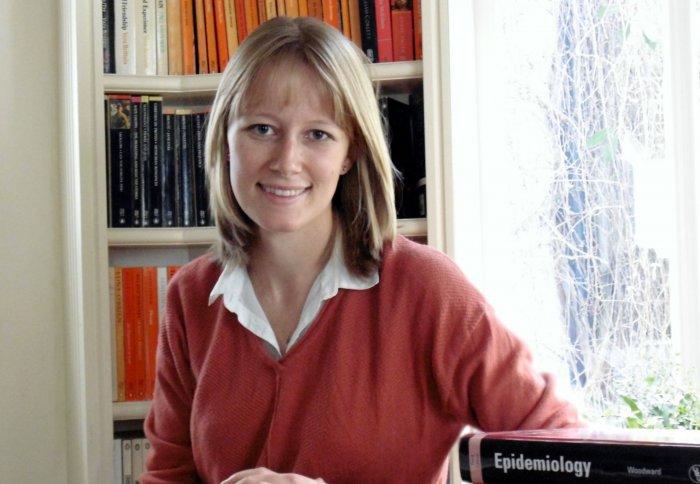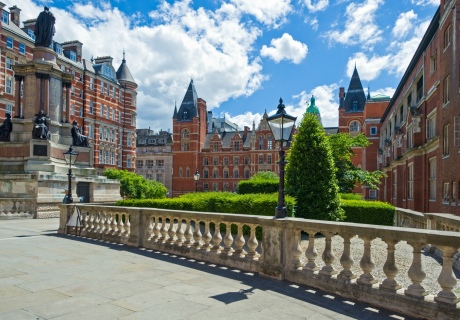Imperial early-career scientist dubbed 'broadcaster of the future' by BBC: a Q&A

Dr Daisy Fancourt has been selected to take part in the BBC's 2017 New Generation Thinkers programme.
She is one of ten academics at the start of their career whose research will be made into radio and television programmes for the BBC, in collaboration with the Arts and Humanities Research Council (AHRC). The chosen ten will benefit from a unique opportunity to develop their own programmes for BBC Radio 3 and regularly appear on air.
Dr Fancourt is research fellow at the Centre for Performance Science, a cross-institutional partnership between the Royal College of Music (RCM) and Imperial College London. Her research focuses on the effects of arts participation on health, the use of the arts within clinical settings, and the psychosocial impact of cultural engagement at an individual and public health level.

Dr Fancourt works across Imperial and the Royal College of Music (pictured)
The Thinkers were selected from hundreds of applications from academics at the start of their careers, and the final ten were chosen for their ability to demonstrate a passion to communicate their scholarship to a wider audience. They will spend a year being mentored by producers from Radio 3’s Free Thinking programme.
Dr Fancourt and the nine other researchers will be publicly unveiled at a free event recorded as part of BBC Radio 3’s Free Thinking Festival at Sage Gateshead on 18 March and broadcast on the 4 April, with further programmes about their research to be aired throughout 2017.
Caroline Brogan spoke with Dr Fancourt about the good news and her work in general.
How does it feel having been accepted onto the scheme and how have you found the whole selection process?
I’m really excited to be part of the BBC/AHRC New Generation scheme! The selection process was quite daunting as everybody had such interesting research to present, so I’m very honoured to have been chosen.
Which part of your work do you hope to highlight the most during the scheme? Are there any areas in particular you’d like to focus on?
Science currently focuses so much on healthy lifestyles, and scientists have such strong data on the effects of things such as exercise, diet, social support and mindfulness. However the effects of arts, community and cultural engagement are much less understood.
I’ve been speaking at different science festivals over the past year to people who are passionate about science. With the BBC scheme I’ll have the opportunity to speak to people who are passionate about the arts, too.
– Dr Daisy Fancourt
Royal College of Music
I hope that my research will help to reveal more about how these activities can support our health, and I want to use this opportunity to promote these findings so that people can make the most of the rich and diverse arts and cultural sector that we have in the UK.
I also want to raise the profile of the many fantastic arts and cultural organisations who are already delivering pioneering work in hospitals, hospices, nursing homes and communities, like one of our project partners, Tenovus Cancer Care, who run choirs across Wales and in England involving over 1,500 people a week who are affected by cancer.
Tell us more about your academic work, and what you’re currently doing to engage with wider audiences?
My research looks at the impact of arts and cultural engagement on health, which generally involves two aspects. One is looking at how taking part in arts and cultural activities (such as going to galleries, reading, listening to music and visiting heritage sites) can affect health across the lifespan. Another aspect is identifying specific challenges associated with certain health conditions and exploring the effects of targeted arts programmes on those conditions.
For example, over the past few years I’ve worked with many different people, including mental health service users, cancer patients, carers, older adults with dementia, healthcare staff and women with postnatal depression to explore the effects and potential benefits of interventions such as group drumming, arts workshops and community choirs.
As my PhD was in psychoneuroimmunology, I look at the psychological effects of arts engagement, and the biological effects on stress hormones and immune proteins. I also undertake statistical analyses of large datasets and cohort studies to look at effects at a public health level.
What part of the scheme are you most looking forward to taking part in? Is there a particular side of it you’re most excited about?
I really enjoy public engagement. I’m currently the British Science Association’s Jacob Bronowski Award Lecturer for Arts and Science, so I’ve been speaking at different science festivals over the past year to people who are passionate about science. With the BBC scheme I’ll have the opportunity to speak to people who are passionate about the arts, too.
Also, as most of the research I do with my colleagues goes into academic journals and conferences, it’ll be wonderful to explain our work to wider audiences, especially as the findings have direct implications for the public.
What else have you been working on?
I’ve just had a book published, ‘Arts in Health: Designing and Researching Interventions’ (Oxford University Press), that focuses on the work I do and the findings in my field, and provides a complete overview of how the arts are being researched and put into practice within the NHS and other healthcare systems around the world.
Article supporters
Article text (excluding photos or graphics) © Imperial College London.
Photos and graphics subject to third party copyright used with permission or © Imperial College London.
Reporter
Caroline Brogan
Communications Division